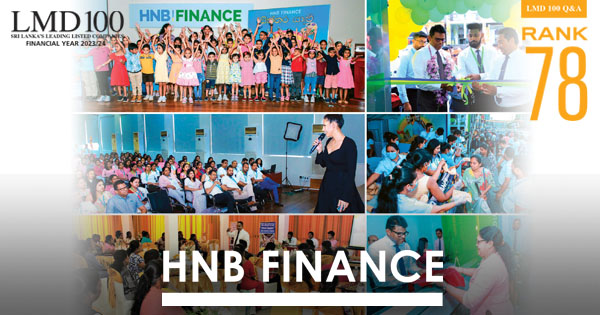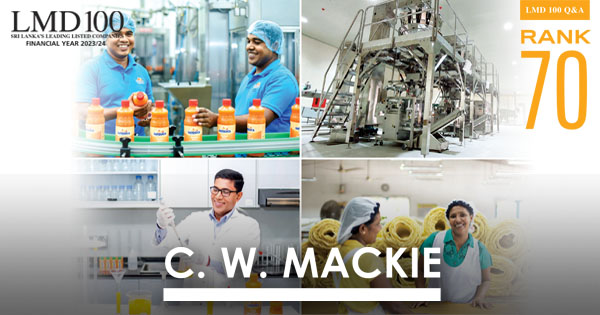SECOND BOARD Q&A
TALAWAKELLE TEA ESTATES
Q: What are the challenges facing your sector?
A: Apart from climate change, the greatest challenges plantation companies face are rising costs of production, stagnant productivity output by workers and demand for higher wages. Availability and affordability of agrochemicals are other concerns.
Sri Lanka harvested 340 million kilogrammes of tea annually, pre-2013. Today, we are down to 300 million kilogrammes a year. Plantation companies bear the triple burden of managing people, product and the environment – while brands and retailers who buy our products have higher margins than producers.
Q: What is the main impact of economic conditions on the sector?
A: The unscientific decision to discontinue fertiliser and agrochemical inputs will have a debilitating long-term impact, and result in lowered agricultural output. Agrochemicals, fungicides and weedicides are critical.
In fact, plantation companies use them judiciously to comply with stringent regulations on maximum residual levels allowed by buyers overseas. Both tea and rubber industries have been impacted by the unavailability of these agro-inputs.
Talawakelle Tea Estates (TTE) has mitigated the impact of this crisis on our workforce and other stakeholders by running an ethical and responsible sustainable business. A 360 degree systems management approach ensures employee welfare; while in terms of profitability, 2021/22 was a good year for TTE.

Managing Director
Hayleys Plantations Sector
Q: What were your major achievements in 2022?
A: The greatest achievement for Talawakelle Tea Estates was how TTE took care of its workforce during the COVID-19 pandemic and economic crisis. During the pandemic, the food security, as well as health and safety of our employees, were ensured.
Currently, home gardening is being promoted and water bodies on the estates have been populated with fish to afford access to proper nutrition. Excess fresh produce can be sold at an outlet run by Hayleys in Colombo while a weed buyback scheme offers another avenue for income generation.
Extra food bags were offered to workers demonstrating over 75 percent attendance and free Deepavali packs were provided for the first time for all workers. TTE shared higher than usual profits with its workers to help them tide over the crisis.
TTE was selected as Asia’s second-best workplace of 2021 in the large category – the first plantation company in Sri Lanka to be so certified. And TTE was also shortlisted for the World Sustainability Awards held in Germany.
Q: What is the role of corporates in Sri Lanka’s economic revival?
A: As corporates in the agriculture industry, we can reset Sri Lanka provided we have necessary governmental support. The landholdings granted for agriculture are too small to make a success of it. Although 24 percent of the population is directly engaged in agriculture, our sector contributes only seven percent to GDP because of its small scale and low value addition.

Director/Chief Executive Officer
Talawakelle Tea Estates
Q: How is climate change impacting the business agenda in Sri Lanka?
A: Climate change is a reality that the plantation sector has to live with daily. TTE has signed up for Science Based Target initiative (SBTi) on climate change while progressing towards achieving net zero status years ago. TTE is the first plantation company in the world and the only organisation in Sri Lanka to be pledged, validated and approved by SBTi.
Q: Should organisational performance and environmental sustainability go hand in hand? How is this being addressed by your company?
A: Yes. As a plantation company, ecosystems services are crucially related to our every operation in agriculture, field and factory manufacturing processes.
Our projects include planting native, endemic and endangered plants, and conservation of wildlife in partnership with private and state bodies; renewable energy projects; ‘A Home for Every Plantation Worker’ programme, which built 30 new houses in 2021/22; and 53 early childhood development centres.
Q: Outline your company’s plans…
A: One of the major challenges facing the expansion of our sector is out-migration of workers. We are committed to enhancing the revenue sharing model to build loyalty. TTE is also promoting smart agriculture; and the use of MIS and drone technology; along with regenerative agriculture and diversification into cultivating cinnamon and coconut.
The government must avoid ad hoc policy-making to safeguard the lives and livelihoods of future generations. If their nutrition status is affected, it will impact future generations mentally, emotionally and physically.






